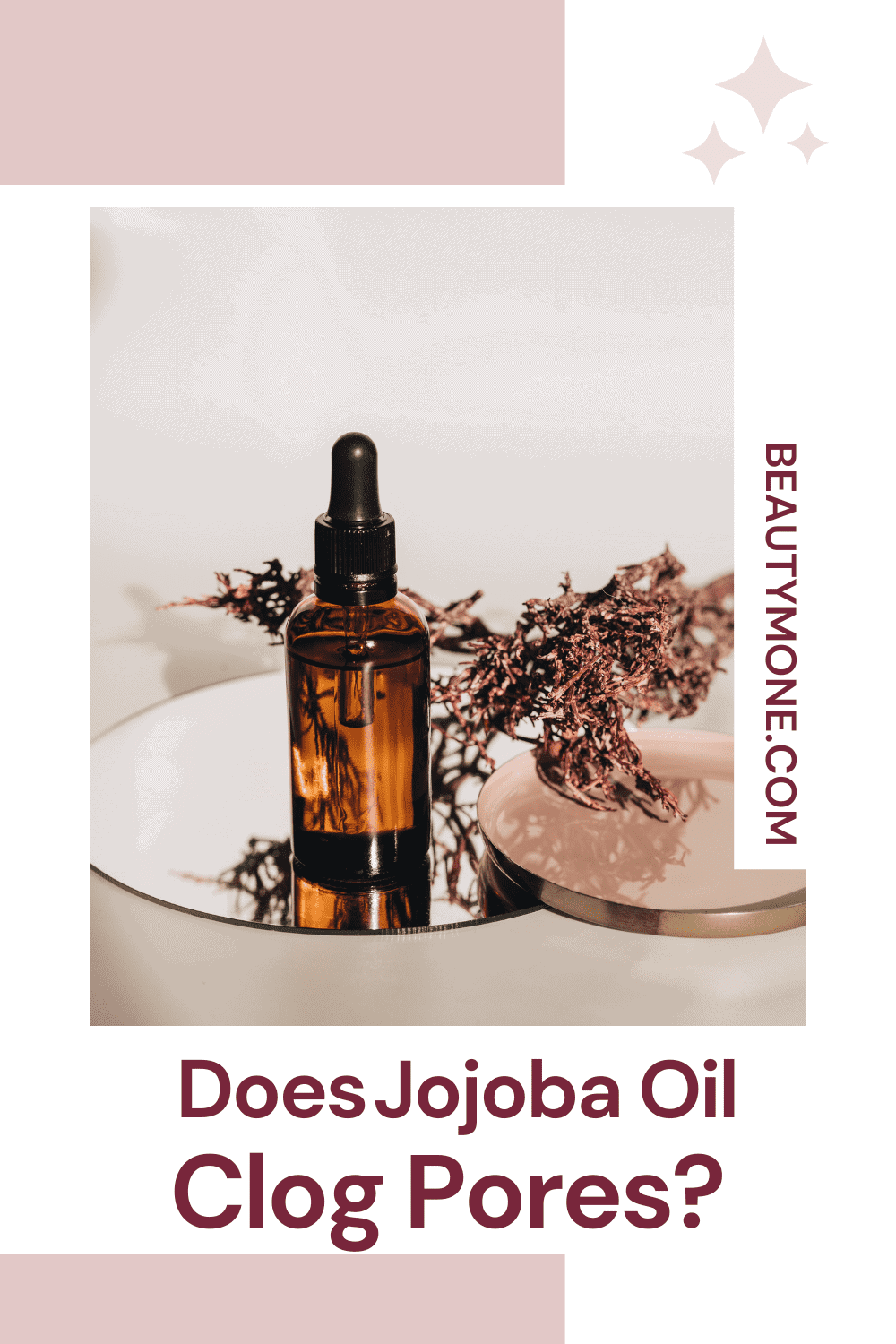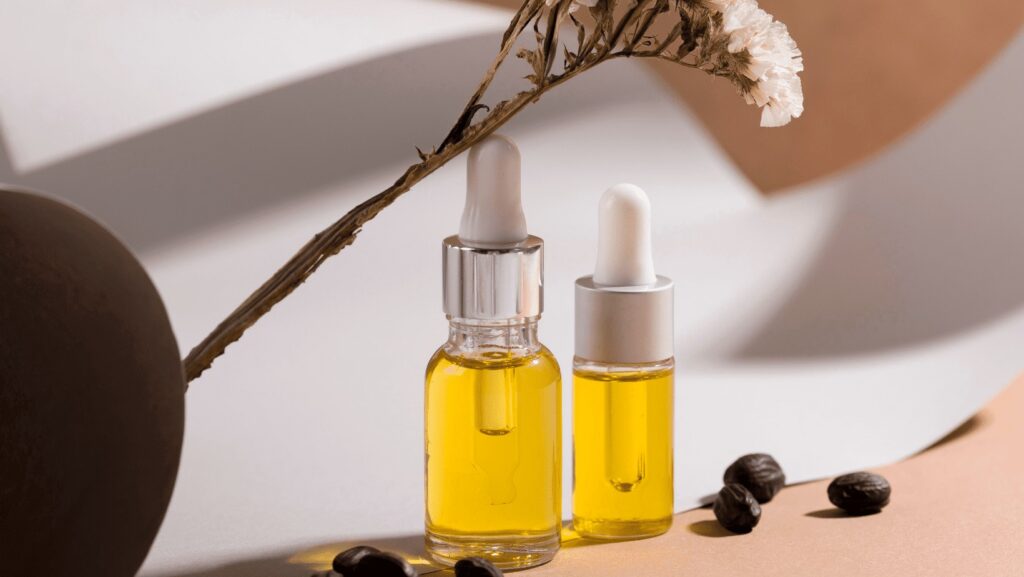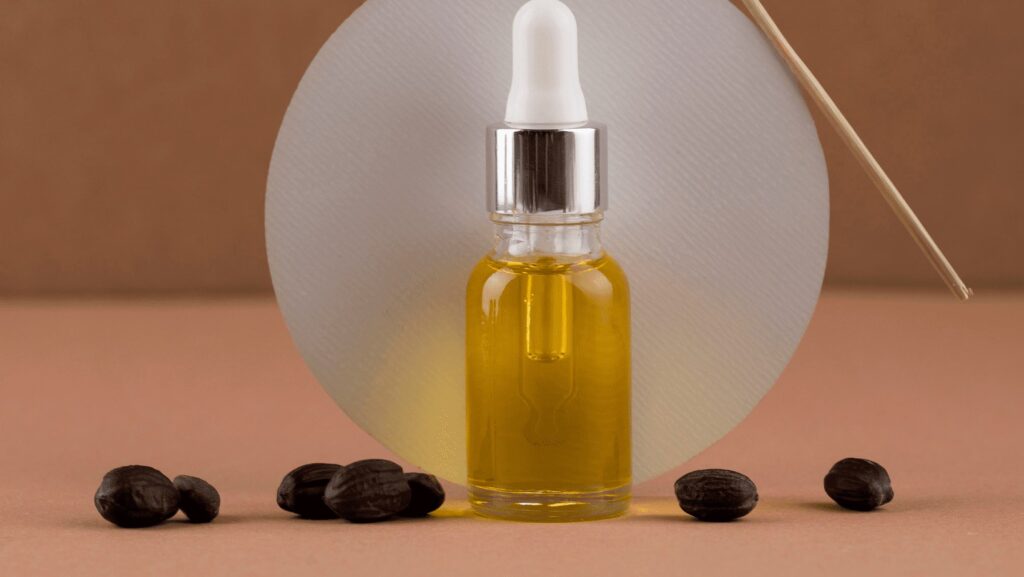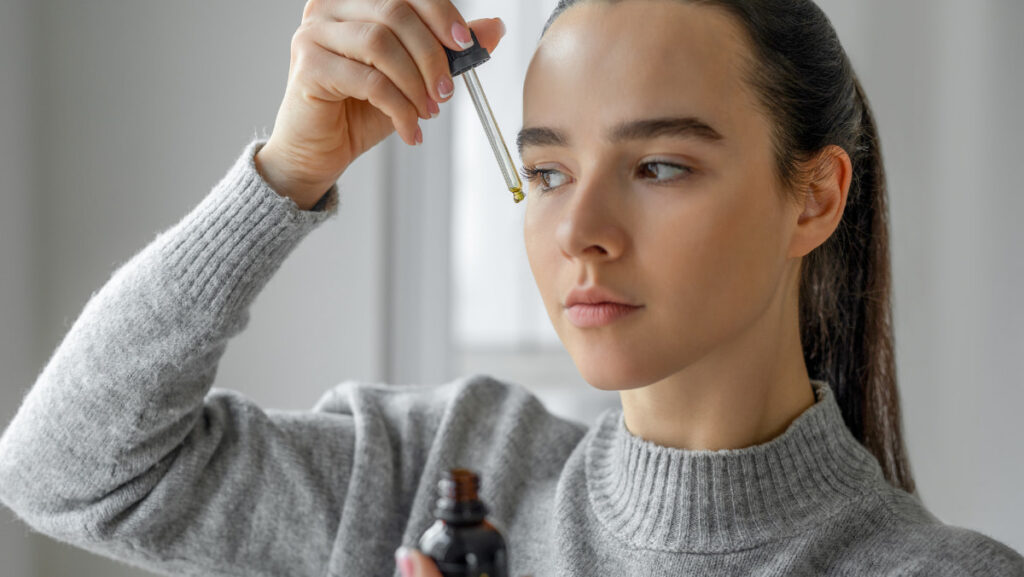
You’re probably wondering, “Does Jojoba oil clog pores?” It’s a question that’s been bugging skincare enthusiasts and beauty gurus alike. But don’t worry – we’ve got the answer!
Jojoba oil, derived from the seeds of the jojoba plant, is similar to your skin’s natural sebum. That means it’s less likely to mess with your skin barrier or cause breakouts like some heavier oils might. It doesn’t have a high oleic acid content like coconut oil, which can be heavy and pore-clogging for some people.
In this article, we’ll dive deeper into why jojoba oil doesn’t clog pores, its benefits for different types of skin, and how to use it in your skincare routine properly. So stay tuned – you might just discover the secret ingredient missing from your beauty regimen!
So stick around if you’re looking to give your skincare routine an upgrade or are simply curious about this wonder oil!
Does Jojoba Oil Clog Pores?
To get straight to this article’s point, Jojoba oil does not clog pores. In fact, it can help to reduce the appearance of enlarged pores and is often used to treat acne.
Jojoba oil is a natural ingredient in many beauty products because of its beneficial properties. The molecular structure of jojoba oil makes it incredibly lightweight and non-greasy, with a unique ability to penetrate deeply into the skin without blocking pores.
Because jojoba oil is so closely related to the fatty acids naturally produced by our body, it can help balance out issues such as excessive dryness or excess production of sebum on oily skin while also providing much-needed hydration and nourishment that helps repair the damage done by outside factors like pollution or sun overexposure.
In addition to acting as both an emollient (a moisturizer) and occlusive agent (a protective barrier against water loss), this versatile product also acts as an anti-inflammatory, which has been proven helpful in treating acne due to its ability to reduce redness associated with breakouts.
With all these incredible benefits, so many people are turning towards more natural solutions for their skincare needs when considering ingredients that won’t block your pores!
Now let’s get into some hard facts:
| Component | What It Does | Percentage |
|---|---|---|
| Gadoleic Acid (Eicosenoic acid) | – have emollient properties – be non-comedogenic (does not block the skin’s pores) – be readily absorbed by the skin – balance the oil in the skin, making it less oily | 67.85–75.50% |
| Erucic Acid | – be a natural lubricant for skin and hair – have non-greasy emollient properties – provide oxidative stability – have a silky texture – be an effective natural alternative to silicone in skin care products | 12.60–14.81% |
| Oleic Acid | – maintain the softness, suppleness, and radiance of skin and hair – stimulate the growth of thicker, longer and stronger hair – reduce the appearance of aging, such as premature wrinkles and fine lines – eliminate dandruff and thereby support hair growth boost immunity – exhibit anti-oxidant properties | 7.86–10.99% |
Jojoba oil is rich in beneficial components like Gadoleic acid (Eicosenoic acid), which takes up between ~65%-75% of its makeup! It also contains significant amounts of Erucic and Oleic acids.

Is Jojoba Oil Comedogenic?
To put it simply, non-comedogenic products are specifically designed and formulated so they don’t clog your pores. That means the ingredients in non-comedogenic skincare products are light and gentle and allow your skin to breathe.
Often, hydrating and revitalizing products contain synthetic ingredients or heavy oils that can block your pores, causing breakouts or excessive oil production.
While heavy oil products have their place in the world of beauty, they can be harmful to anyone with sensitive or acne-prone skin, especially after prolonged use.
Common ingredients in skincare products are rated on a scale of 0–5. The higher the number is, the higher the chances are that your pores may get clogged.
Generally, values of 2 and below are unlikely to cause clogged pores. So, products containing ingredients with these scores are considered non-comedogenic.
So, is jojoba oil non comedegenic? Jojoba oil has a comedogenic rating of 2 and is considered non-comedogenic. This means that it has a moderately low chance of clogging pores.
How Your Skin Type Reacts To Jojoba Oil
| Skin Type | Reaction |
|---|---|
| Oily | Balances Sebum Production |
| Dry | Hydrates & Moisturizes |
| Combination | Balances & Moisturizes |
| Sensitive | Gentle & Non-irritating |
| Acne-Prone | Does not clog pores |
While everyone’s experience may differ slightly due to unique individual factors (like age, diet, and environment), these are the general ways your skin type could react to jojoba oil. So don’t shy away from giving it a try!
Understanding Jojoba Oil And Its Properties
You might be familiar with jojoba oil as a popular ingredient in beauty products, but do you really know what it is and how it affects your skin? Let’s dive right into the details.
As we already talked about, Jojoba oil comes from the seeds of the jojoba plant, which is native to North America. What makes this oil unique is its close resemblance to our skin’s natural sebum or oil production.
Jojoba Oil Benefits For Skin
The jojoba oil benefits for the skin are pretty versatile, making it an absolute gem to add to your skincare routine. Here are the main benefits of Jojoba Oil:
Balancing Oil Production
Jojoba oil is an excellent natural ingredient for balancing oil production in the skin. This means it can help regulate the amount of oil on the skin’s surface.
When the skin senses enough oil present, it produces less sebum, reducing the likelihood of clogged pores, blackheads, and acne breakouts.
Anti-Inflammatory Properties
Jojoba oil is known for its anti-inflammatory properties and can be beneficial for the skin in many ways.
Inflammation is a common cause of many skin conditions, including acne, rosacea, eczema, and psoriasis. Its gentle and non-irritating properties make jojoba oil ideal for sensitive skin.
Jojoba oil contains natural anti-inflammatory compounds that can help reduce redness, swelling, and irritation in the skin. It can also help soothe and heal sunburns, minor cuts, and other skin irritations.
Healing And Protecting
Jojoba oil has many healing and protecting benefits for the skin. The oil is rich in vitamin E, a potent antioxidant that helps protect the skin from damage caused by free radicals and environmental stressors, such as pollution and UV rays.
Jojoba oil also contains natural antibacterial and antifungal properties that help prevent and treat infections.
Moisturizing Properties
Jojoba oil is a highly moisturizing natural ingredient, which means it can penetrate deeply into the skin, providing long-lasting hydration. This makes it an ideal natural ingredient for dry skin.
Jojoba oil also contains natural fatty acids that help nourish and protect the skin, improving its elasticity and reducing the appearance of fine lines and wrinkles.
The oil’s lightweight and non-greasy texture makes it easy to apply and absorb into the skin, leaving it feeling soft, smooth, and supple.
Anti-Aging Properties
The vitamins E & vitamins B in jojoba oil can help reduce wrinkles due to their ability to penetrate deep into the skin cells, providing intense hydration benefits at a cellular level – resulting in softer, more supple-looking complexions over time.

What Are The Side Effects Of Jojoba Oil?
Jojoba oil is generally considered safe for most people and is not associated with any major side effects. However, there are a few things to keep in mind when using jojoba oil on the skin:
- Allergic reactions: Although rare, some people may be allergic to jojoba oil. If you experience itching, redness, or swelling after using jojoba oil, discontinue use and consult a healthcare professional.
- Acne breakouts: Jojoba oil is a non-comedogenic oil (which means it doesn’t clog pores). However, if you have acne-prone skin, jojoba oil may not suit you, as it could trigger breakouts.
- Sun sensitivity: Jojoba oil does not provide sun protection and may increase your sensitivity to the sun. It’s best to avoid using jojoba oil before prolonged sun exposure or use sunscreen along with it.
- Greasiness: Jojoba oil is an oil-based product, and using too much may make your skin appear greasy. Use a small amount and adjust as needed.
Jojoba oil is a safe and effective natural ingredient for the skin. However, it’s essential to do a patch test and consult a healthcare professional if you have any concerns or experience adverse reactions.
Does Jojoba Oil Expire?
Jojoba oil is known for its remarkable stability and extended shelf life. Unlike many other oils, it doesn’t go bad or turn rancid easily. In fact, if you store pure jojoba oil correctly, it can maintain its effectiveness for several years.
However, it’s essential to be mindful of potential oxidation and deterioration, especially when the oil is exposed to heat, light, and air. Over time, these factors can lead to a loss of some of the oil’s natural nutrients, diminishing its effectiveness.
To ensure you get the best quality and results from your jojoba oil, it’s advisable to use it within two years of opening the bottle. Proper storage is key – store your jojoba oil in a cool, dark place, away from direct sunlight and heat, and ensure the bottle is securely sealed when not in use.
If you’re uncertain about the quality of your jojoba oil, you can perform a simple smell test. If it smells rancid or has an unusual odor, or if it appears cloudy or discolored, it’s a good idea to dispose of it and invest in a fresh bottle.
How To Use Jojoba Oil For Face?
You might wonder how to use jojoba oil on face areas; here’s the proper answer. To apply jojoba oil to the skin, follow these steps:
- Cleanse your face or the area you want to apply the oil. Use a gentle cleanser to remove any dirt or makeup.
- Take a small amount of jojoba oil (usually a few drops) and warm it up between your palms.
- Gently massage the oil into your skin using circular motions. Start with a small amount and add more if needed.
- Pay special attention to areas that tend to be drier or more prone to wrinkles, such as around the eyes, mouth, and forehead.
- Let the oil absorb into your skin for a few minutes. You can leave it on overnight or use it as a daytime moisturizer.
Jojoba oil is safe for most skin types and is often used as a natural alternative to commercial moisturizers. It can also be used to remove makeup, as a massage oil, and as a hair treatment.
Other ways to use jojoba oil in your routine:
- It can also be used to remove makeup.
- It can also be used as a massage oil.
- It can be used as a hair treatment.
- It can be used as part of a lip balm formula to hydrate dry lips and make them smooth again.
- Clay jojoba oil can be used as a facial mask to detoxify the skin and address acne issues.
Jojoba’s unique composition also helps enhance the effectiveness of other ingredients it’s paired with.

Comparing Jojoba Oil To Other Common Natural Skincare Ingredients
When compared with other popular oils, such as grapeseed oil, sunflower seed oil, or even cocoa butter, jojoba stands out because of its high content of oleic acid (omega-9 fatty acid) and linoleic acid (omega-6 fatty acid). These elements help in wound healing and maintaining healthy skin.
Coconut oil has been a staple in many beauty routines for its rich, moisturizing properties. It’s often used as a makeup remover or lip balm because it effortlessly dissolves stubborn mascara and lipstick while providing your lips with much-needed hydration.
However, due to its high oleic acid content, it might not be the best choice for those struggling with mild acne.
On the flip side, you’ve got grapeseed oil, which is abundant in linoleic acid – an essential fatty acid that strengthens your skin barrier and promotes wound healing. This makes it ideal for acne-prone skin types!
Sunflower seed oil can help skin cleansing by opening blocked pores and removing dead skin cells. Just like our star player – jojoba – sunflower seed oil is known for being non-comedogenic (it won’t clog pores) and is highly absorbable by the skin.
However, when compared directly to jojoba – sunflower lacks some of that versatility we adore about jojoba.
Last but not least, it is not an oil but butter, cocoa butter. Cocoa butter is celebrated for its remarkable ability to nourish and hydrate the skin.
Packed with essential vitamins, minerals, and antioxidants, it has rightfully earned a reputation as an effective and potent moisturizer. The biggest difference to jojoba is that cocoa can be pore-clogging.
| Type | Oleic Acid | Linoleic Acid |
|---|---|---|
| Jojoba Oil1 | 7.9–11% | 0.2–1.2% |
| Coconut Oil2 | ~9% | 2% |
| Grapeseed Oil3 | 15.8% | 73% |
| Sunflower Seed Oil4 | 30% | 59% |
| Cocoa Butter5 | 34.5% | 3.2% |
Oils that are high in linoleic acid can help regulate sebum production and prevent clogged pores, making them particularly beneficial for oily and acne-prone skin. That’s why grapeseed oil and sunflower seed oil are very good for these skin types.
Oils high in oleic acid are heavier and offer deeper hydration, making them ideal for dry skin but can benefit sensitive or irritated skin as well. However, they can be pore-clogging for those with oily, acne-prone, or even combination skin.
As you can see from these numbers, compared to cocoa butter and sunflower seed oil, jojoba falls on the lower end of oleic, which means it is not pore-clogging.
Wrapping Up: So, Does Jojoba Oil Clog Pores?
Alright, let’s cut to the chase. You’ve been wondering all along, “Does jojoba oil clog pores?” Well, it’s time for the final verdict.
Jojoba oil is a unique carrier oil that stands out from its peers. Why so? Because this golden liquid is closer to your skin’s natural sebum. It has a wax ester composition, which helps maintain your skin barrier without messing up your pores.
You might be thinking, “What about my mild acne?” That’s where things get even more interesting! Research suggests that because jojoba oil is similar to our skin’s natural oils, it can actually help regulate sebum production—meaning less oily residue and fewer breakouts.
But wait, there’s more! Jojoba isn’t just good for keeping those pesky pimples at bay—it also works wonders as a makeup remover and lip balm. Its nourishing properties keep lips smooth while effectively wiping away stubborn mascara or long-wear lipstick stains.
If you’re still worried about pore-clogging potential (we understand), consider blending jojoba with other non-comedogenic oils like grapeseed or sunflower oil. These are rich in linoleic acid—a fatty acid known for wound healing—that won’t block pores either.
For an extra dose of pampering, whip up a homemade facial mask using clay and jojoba oil once in a while—it’ll give you all the benefits of this amazing product while letting you enjoy some well-deserved ‘me’ time!
Frequently Asked Questions
Articles Sources
We want you to know that the information in this article is meant to be informative, but it’s no substitute for chatting with a healthcare pro. If you have any concerns about your health or a specific condition, do yourself a favor and reach out to a qualified medical expert.
We do our best to keep things accurate and up-to-date, but the world of medicine moves fast. To get the latest and most reliable info, consider checking out the sources we’ve used in this article:
- Awad NA, Eliraq M, El-Bassel EH, et al. Evaluation of the Effect of Elite Jojoba Lines on the Chemical Properties of their Seed Oil. Molecules. 2022;27(12):3904. Published 2022 Jun 17.
We’ve tapped into these sources to create this content, and they can dive deeper into the topics we’ve covered. Remember, though, always consult with your healthcare provider for personalized medical advice and recommendations.

I love using Jojoba oil! Especially at night and mixing it with a lavender of rosemary essential oil to help calm down my skin 🙂